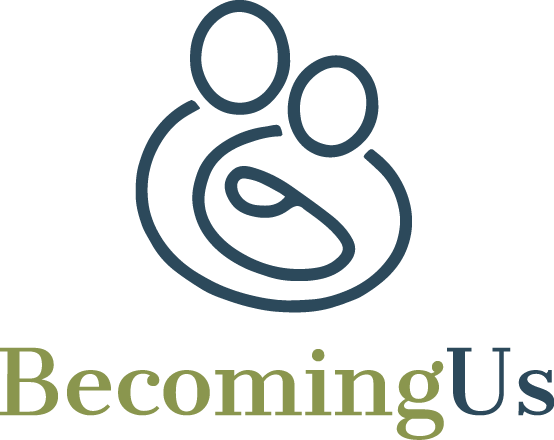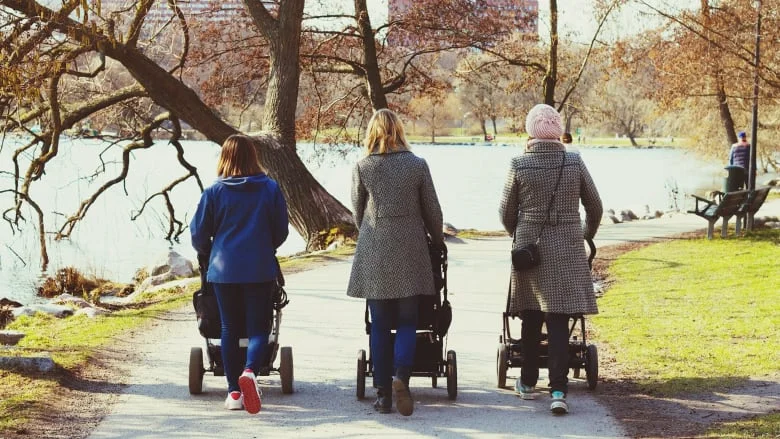Dads get the Blues Too
How motherhood connects us more than before
The proverb may well go that it takes a village to raise a child. But comedian Ali Wong was far more blunt when she said of mothers groups in her Netflix special Hard Knock Wife, "When you're a new mum on maternity leave it's like The Walking Dead … you've just gotta hook up with a crew to survive."
5 Things Mothers want their Partner to Know
(But Don't know How to Say It)
1. Our new mother self-esteem can be a fragile thing, our confidence just a veneer.
We've been bombarded with perfect images of motherhood on the screen and in the pages of magazines for years before now. This makes our expectations of ourselves, and maybe your expectations of us, impossible to live up to.
Motherhood feels like a big gig, so we're ‘faking it till we make it’. And sometimes not sure that we will.
Because there's no yardstick for ‘successful parenting’. No measure of performance like salary raises or work bonuses. Nobody gives you a bottle of champagne for superior nappy changing.
We looked to our bosses, co-workers or friends to feel good about ourselves before.
Now, it’s pretty much only you.
We need your your appreciation and encouragement. You might need to let us know you want the same from us too.
2. We’re learning.
Some of us bought into the myth that motherhood would be instinctive. And yes, maybe some things are, but other things are a steep, steep learning curve – and we're feeling some performance anxiety.
Some things we thought would come naturally are taking longer than expected. Sometimes the responsibilities of looking after our little person can weigh heavy on us. We worry. That’s why we’re snappy sometimes.
Share the responsibilities so it’s not just on our shoulders. We'll appreciate you for that.
Please be curious, wonder what it’s like for us, ask us how we're going and just listen if you don’t know what to say. Parenthood is not a series of problems to be solved; it’s a journey for us to share. Let’s take the pressure off, experiment, make mistakes, stuff things up, forgive each other and laugh over it together at the end of the day.
Oh, and remind us to ask how you're going, you're learning too, we forget that.
3. Our lack of interest in sex isn’t personal. Really.
We’ve been covered in sticky body fluids or mashed vegetables all day, we’re ‘touched out’ from an overdose of skin and being clutched, pulled and scratched (wow, those little fingernails can hurt!)
After a long day of giving out, giving out, giving out, sex can feel like an unreasonable demand on an already exhausted body.
What we really, really, really need is some “getting”. Time to ourselves, a bath run or some vacuuming done. No-strings-attached affection - your arms around us so we can finally relax.
And a foot rub. We really need a foot rub.
We need to know you care and love us and still think we’re beautiful even though we’ve got baby spit caked in our hair.
Keep gifting us this and our tanks will fill again and we will feel like giving back. Eventually we'll remember that sex means getting too. Because while resentment is a contraceptive, gratitude is an aphrodisiac...
4. We're worried about being judged.
By you, by our mother, by your mother, by other mothers, and yet – we judge ourselves most harshly.
Somewhere along the line we have bought into two big untruths. First - that we will love every single moment of being a mother, and second: that if we don’t, it means we don’t love our baby. Where the **** did that come from?
Because the truth is there's times we feel bored or lonely or frustrated or overwhelmed or disappointed, and then we feel guilty about it.
Other mothers don’t admit it, but we’re starting to suspect that most of them feel like this too. Wouldn't it be great if we could all just relax and talk about it?
We might make some new friends that way...
All this means we hold a lot of stuff inside. It sits there bubbling and churning like lava in a volcano – and because you’re the one around the most, you're likely to get it when we burst. We feel guilty about that too.
5. We expected that life would get back to normal, but it’s starting to dawn on us that it never will.
We expected to feel more in control, but we’re working out it’s the baby that’s going to be calling the shots from now on.
Some days we feel a caged.
On these days we feel envious that your life hasn’t changed as much ours.
We know this isn’t your fault, of course, but we don’t know what to do about it.
On those days we might be snappy as soon as you walk through the door, especially when you look so good in your still-clean suit.
Please understand that this isn't personal, although it must feel like it is. It’s just such a big adjustment for us – life after baby can be very different to life before – and every day and for the next 18 years is now becoming real.
We need regular time out just to be ourselves again. Just to be us and not "be a mother". That word carries so much responsibility, sometimes we need to leave it at the door. We need your support to do this.
These things can be hard to put into words and they take some getting used to. Nobody told us this was part of the full bloom of parenthood. We weren’t prepared that WE would have to grow in so many different ways along with our baby, with all the joys, the challenges, the adjustments and the changes, big and small, that they bring.
But we want to share it. All of it. With you.
What we want you to know most of all is that we need you to walk with us. Keep hold of our hand and put your arm around us, so we can create this new – and maybe even better – normal together.
Elly Taylor is a transition into parenthood educator, award-winning author and Founder of Becoming Us. If you're in North America, you'll find Elly at the following events in June & July 2018: https://ellytaylor.com/us-summer-tour-registration/.
Becoming Us with Counselor Carol Peat
Full Circle Moments
The "transition" into parenthood? Really???
Professionals commonly call it the "transition into parenthood", which makes it sound like you gently stroll into it, but for parents many days can feel more like "Survivor" than a walk in the park!
And "transition" is misleading. Relationship Counsellor, Parenthood Researcher (and mother of three) Elly Taylor discovered that parents go through multiple transitions - and that some are more challenging than others. She created 8 steps to guide parents through them. Find out more below.
Hellooo? Who's there?
We are very fortunate in Australia to have a Midwifery model of maternity care. One of the things this means for expecting mothers, fathers and partners is we get the opportunity to establish a relationship with the woman who will also guide us through our baby's birth.
According to Professor Jenny Gamble, Head of Midwifery at Griffith University in Brisbane, continuity of care means better birth outcomes for new families.
I can see why.
For me, it meant meeting the most gorgeous Irish woman. She had me at "hello". Noreen became such a big part of our family's birth stories (she was there for all three of them!), I have written about her in my book Becoming Us.
Over the time of our prenatal visits, Noreen set us up for early labour at home, including teaching my husband to do "birth circles" with his hands on my hips. It felt like we were dancing. She taught him to do acupressure when the pains became intense. I felt so grateful to both of them. And then, when it was time, she gently suggested my husband stand behind me, so I could lean into him and he could hold me as I birthed our baby. He literally, and figuratively, had my back.
I can't think of a better start for our new version of "us".
The following day, when Noreen was discharging us from the hospital, I felt bereft. "You're letting me go?" I wanted to ask. Our relationship had ended all too soon. I wanted to take her home.
And I needed to. Because that's when the wheels fell off.
Three weeks after crossing the threshold of our home with our newborn son in my arms, I was wondering what the heck I'd gotten myself into. Was I, we, really cut out for all this. It was so, SO! much harder than I'd expected. I felt despair.
I didn't know it at the time, but I was also crossing the threshold into postnatal depression.
Sure, the community nurse had visited me after my early discharge from the hospital, but I didn't have a relationship with this woman, so it felt more like checks and balances than kind words and kinder eyes. The truth is, I kept a brave face. I wasn't comfortable opening up to her.
So I can't help but wonder if even just one visit with my magic Irish midwife might have made a difference. I know I would have felt more comfortable sharing my struggles with her. I would have answered more honestly on any tests. I would have taken her advice. She, more than anyone, might have been able to see the signs that I wasn't coping because she knew what I was like before...
Maybe this might have led to me getting the help I, we, needed but I didn't put my hand up for.
Motherbirth Interview
Becoming parents is literally the biggest venture into the unknown we know of... and the one we are least prepared for in our culture today.
Elly Taylor, this weeks guest, is a relationship counselor and researcher who has spent the last few decades exploring how having children changes our relationships after facing her her own dramatic wake up call once her first child was born. We go deep with her in this episode about the common traps couples fall into, the 3 main stages of every relationship, and how society is setting us all up for failure with expectations.
Elly wrote the incredible book Becoming Us; her perspective and experience is invaluable. If you've ever looked at your partner and wondered how you ended up where you are, this episode is for you. She believes that couples can thrive throughout the transitions of parenthood - by being prepared for the changes they will face and recognizing that what they're experiencing is normal and healthy.
We knew this conversation was going to be gold when it took 4 tries record - Elly was the most gracious guest and it was worth every try! 😂 Check it out below, in iTunes, or wherever you get your podcasts!
How Much Stress is Too Much after Baby?
Keeping the Love
Parenthood: Comedy, Romance or Adventure?
Book Review: Becoming Us, 8 Steps to Grow a Family that Thrives
Reviewed by: Dawn Bhat, MA, MS, NCC, LMHC appearing in Somatic Psychotherapy Today | Fall 2014 | Volume 4 Number 2 |Personal Reflection
While I was reading Taylor’s book for this review, my then ten-month-old daughter was climbing all over me and pulling herself up to stand by using my knees for support. I felt Taylor’s words speak to me, as if she were a dear companion on my journey of motherhood from the onset.
Taylor knew all about what I experienced during the newborn phase from breastfeeding to a messy house. What shocked me the most was Taylor seemed to know what this meant for my partnership, as we were experiencing the changes both together as one and separately as individuals.
It is no wonder that Taylor is an expert and well-seasoned clinician whose work focuses on transforming couple’s experiences during the critical period between pregnancy and parenting.
I was lucky that SPT’s editor, Nancy Eichhorn, PhD asked me to review Becoming Us: 8 Steps to Grow a Family that Thrives! I doubt I would have known about it otherwise. I hope you find my review a small representation of how informative and formative Becoming Us: 8 Steps to Grow a Family that Thrives is.
Download a copy of the full review here: Becoming Us in Somatic Psychotherapy Today
You can learn how to purchase your own copy of the book here.
Dawn Bhat, LMHC is in private practice in Hicksville, NY. She holds graduate degrees in General Psychology and Clinical Mental Health Counseling. Dawn is a National Certified Counselor and a Registered Yoga Teacher (RYT-500). Dawn has been researching somatic psychotherapy under the guidance of Jacqueline A. Carleton, Ph.D. of the USABP since 2010 and has presented scholarly papers and professional workshops regionally, nationally and internationally. Feel free to contact her: www.dawnbhat.com
Your Other Newborn Health Check
It’s been a month or so since you had your baby and things have started to settle down. You’re getting into a sort-of routine, the visitors have dried up and bub excelled at their last health check. Now it’s time for another important check-up: how’s your relationship doing?
This may come as a shock, but according to research, 67% of couples report declined relationship satisfaction in their baby’s first few years. So if you’re starting to sense this in your own relationship – don’t panic! You’re normal and you’re not alone! It doesn't mean there's anything wrong with you, your partner or your partnership - you have probably both been doing an extra great job of giving your precious newborn all your love, attention, and energy. Now you can relax and start to send some of it your partner’s way again.
So when the washing pile is low enough for you to both to peer over it, you might want to check in and see how your partner is doing. They might be missing you - and how things were between you. Some dads can feel a bit excluded through pregnancy, birth and early parenting. I remember one new dad saying this:
"We've got a baby, but I've lost my wife."
Chances are, when you have time to actually stop and reflect, you’ve been missing your partner too. So now’s the time to turn it around and for you both to re-connect as a couple at the same time you’re both bonding with your baby.
To take that first step back to each other, when you have a quiet time, initiate an open conversation. Acknowledge how things have been for you, and ask your partner how they’re doing. From there, make it a priority for the health of your relationship to spend time together, even just for a few minutes, to catch up with each other.
Just as your baby is doing, you’re both going through some big changes and adjustments - most of them occurring on the inside. Let your partner in and let them know you want to know what’s happening inside them too. Here’s a great resource for you both to read as a starting point.
Then it’s the little things that can make a big difference.
Easy to forget in the blur of sleep deprivation, but a simple “please” and “thankyou” shows your appreciation for each other. Apologising if you say something hurtful mends harm. A hug morning and night lovingly bookends each day. Texting or emailing fond thoughts to each other in between means you can stay connected even if your days are now so different.
Sharing a foot rub or taking a walk together in the evenings are a great way to celebrate your relationship – after all, that’s what created your beautiful bub in the first place.
And, over time, they will thank you for it.















